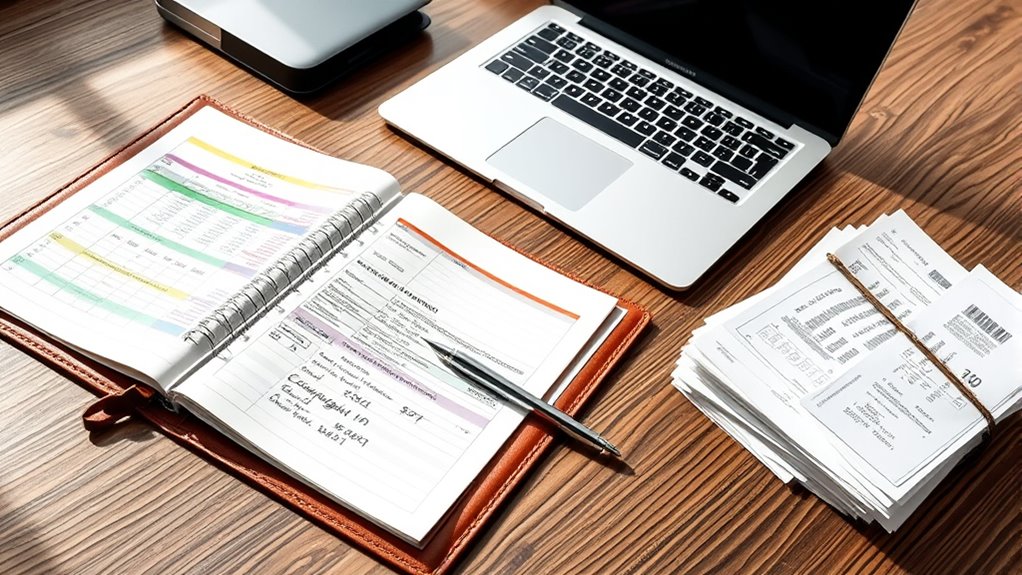When managing event budgets, use essential documents like detailed budget plans, expense tracking sheets, and financial records such as invoices and receipts. These tools help you plan funds across venues, catering, and entertainment, monitor costs in real-time, and maintain transparency and accountability. Proper documentation guarantees you stay within budget and can justify expenses if needed. Keep refining your approach, and you’ll discover how these documents make your event planning more successful.
Key Takeaways
- Budget plan outlining allocation for venue, catering, entertainment, marketing, and contingencies.
- Detailed expense tracking sheets recording receipts, invoices, and payments in real-time.
- Financial documentation including contracts, invoices, and receipts for transparency and auditing.
- Fund allocation strategies ensuring balanced resource distribution across event components.
- Regular monitoring and analysis of expenses to prevent overruns and identify cost-saving opportunities.

Have you ever wondered how organizations keep their finances on track? It all starts with solid budget management documents that guide every financial decision. When planning an event, these documents become your roadmap, helping you allocate funds wisely and monitor expenses diligently. One of the key aspects of effective budget management is fund allocation. You need to decide how much money to dedicate to each part of the event—venue, catering, entertainment, marketing, and contingency funds. Clear allocation ensures that each area gets enough resources without overspending, preventing budget overruns. To do this, you create a detailed budget plan that breaks down the total available funds into specific categories. This plan acts as your financial blueprint, giving you a clear picture of where your money should go and helping you prioritize essential expenses. Proper documentation and record-keeping are vital to maintaining financial transparency and accountability throughout the process.
Alongside fund allocation, expense tracking is essential. As costs start to accrue, you must keep a close eye on every receipt, invoice, and payment. Expense tracking involves maintaining a record of all expenditures to guarantee they stay within your predefined budget limits. This process helps you identify any discrepancies early, so you can adjust your spending if necessary. Using spreadsheets or specialized budget management software simplifies this task, providing real-time updates and visual summaries. By consistently updating your expense records, you avoid surprises at the end of your planning process and maintain control over your finances. It also allows you to analyze spending patterns, identify cost-saving opportunities, and make more informed decisions for future events. Additionally, financial documentation such as contracts, invoices, and receipts is crucial for transparency and auditing purposes, ensuring all expenditures are justified and properly recorded.
Frequently Asked Questions
How Do I Prioritize Expenses in My Event Budget?
You should prioritize expenses by first securing a venue that fits your budget and event needs. Focus on venue selection as it often takes the largest chunk of your budget. Then, allocate funds for essential vendor negotiations, ensuring you get quality services without overspending. Keep a contingency fund for unexpected costs, and cut less critical expenses. This approach keeps your event financially balanced and successful.
What Are Common Mistakes in Budget Planning?
You often overlook venue selection costs, which can inflate your budget unexpectedly. A common mistake is underestimating catering options, leading to overspending or poor quality. About 65% of event planners say misjudging these expenses impacts overall success. To prevent this, set clear priorities, compare venue prices, and choose catering that balances quality and cost. This proactive approach helps ensure your event stays within budget and meets expectations.
How Can I Track Expenses in Real-Time?
You can track expenses in real-time by using a dedicated event budgeting app that allows for instant expense categorization. As you make purchases or pay vendors, log each expense immediately, noting vendor details and costs. This helps you stay on top of your budget and identify potential overspending. Regularly review your categorized expenses and leverage vendor negotiations for better rates, ensuring your event stays financially on track.
What Tools Are Best for Managing Event Budgets?
You should consider using event budget software like Eventbrite or Bizzabo, which streamline budget management and help you stay on track. Expense tracking tools such as Expensify or QuickBooks also work well, offering real-time updates and easy expense categorization. These tools enable you to monitor your budget closely, avoid overspending, and guarantee your event stays within financial limits. Choose software that fits your event size and complexity for best results.
How Should I Handle Unexpected Costs?
When unexpected costs arise, you should implement contingency planning by setting aside a buffer in your budget. Act quickly by negotiating with vendors to find cost-effective solutions or adjustments. Stay flexible and keep communication open with your team and vendors to manage surprises efficiently. This proactive approach helps you control expenses without compromising the event’s quality, ensuring you stay within your overall budget.
Conclusion
By mastering budget management documents, you gain control over your event’s financial future. While these documents bring structure and clarity, they also reveal the unpredictable nature of planning—unexpected costs and shifting priorities. Balancing precision with flexibility, you navigate the fine line between certainty and uncertainty. Embracing this duality, you guarantee your event’s success isn’t just about numbers but about adapting confidently in a dynamic environment. Ultimately, your preparedness transforms challenges into opportunities for growth.









